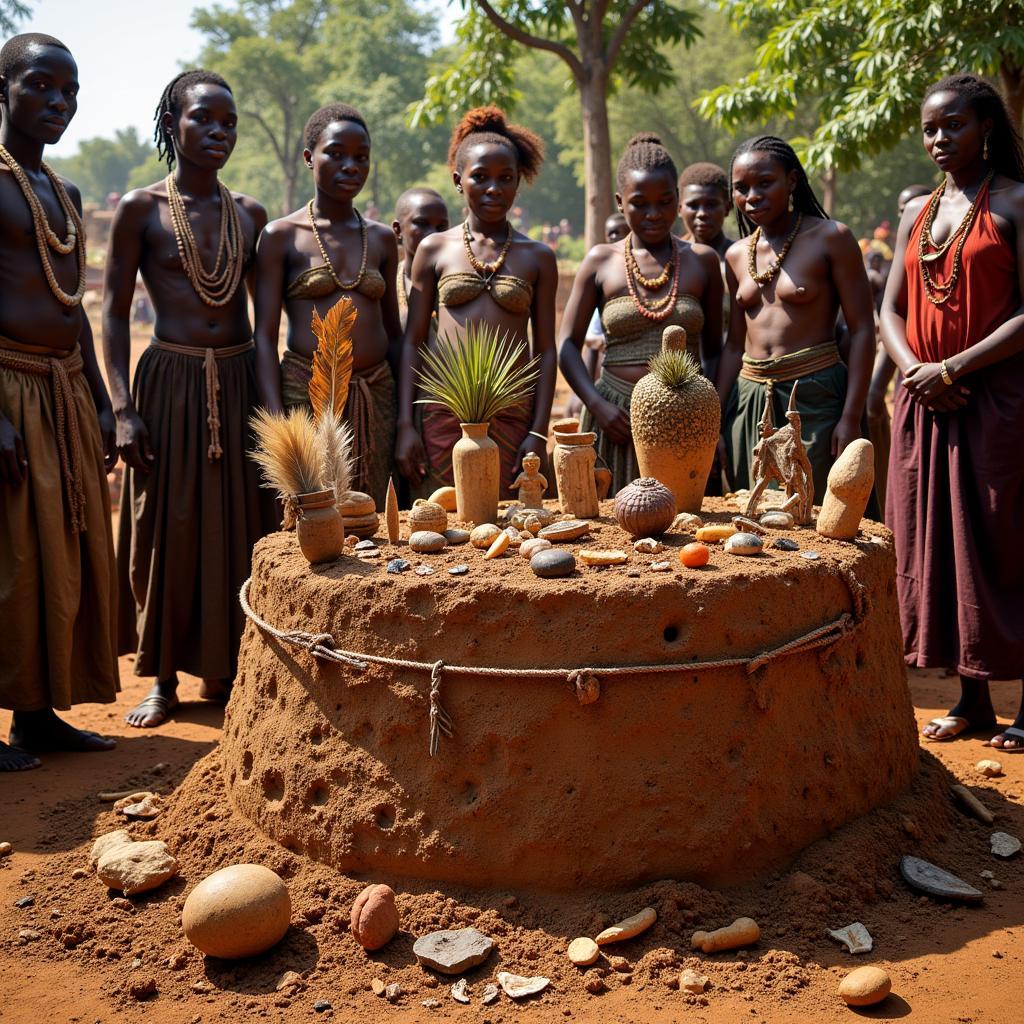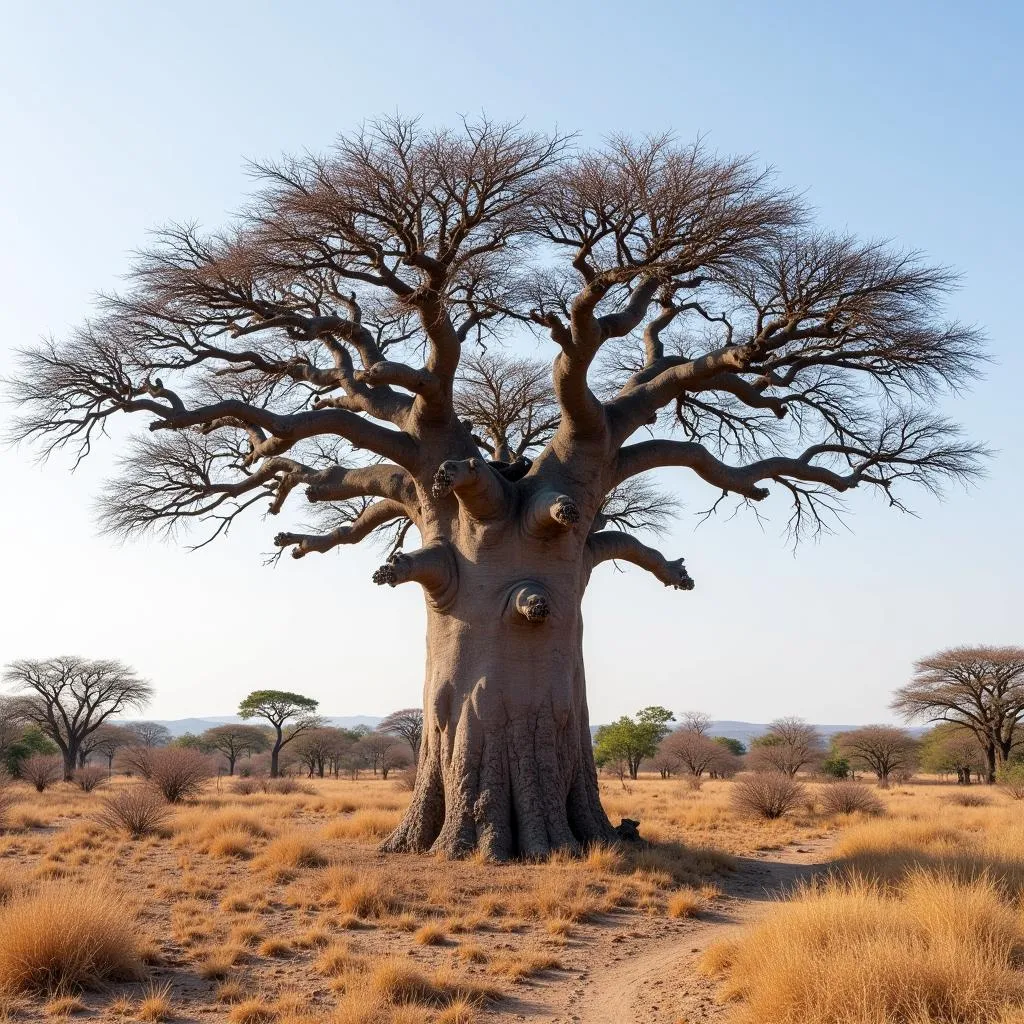Unveiling the Mysteries of the African Altar
African Altars are more than just physical structures; they are profound expressions of spiritual belief, ancestral reverence, and community connection. They serve as a focal point for rituals, offerings, and communication with the divine and the ancestors, playing a vital role in the spiritual and social fabric of many African cultures. 7 african powers altar provides a glimpse into one such tradition.
The Significance of African Altars in Traditional Practices
African altars vary widely in form and function across the diverse cultures of the continent. Some are simple, consisting of a mound of earth or a collection of stones, while others are elaborate constructions adorned with carvings, symbols, and offerings. Regardless of their physical appearance, African altars serve as a bridge between the physical and spiritual realms. They are spaces where individuals and communities connect with their ancestors, deities, and the forces of nature.
- Connecting with Ancestors: Ancestor veneration is a cornerstone of many African spiritual traditions. african ancestral altar explains the deep connection between the living and the departed. Altars serve as a point of contact, where offerings and prayers are made to seek guidance, protection, and blessings from the ancestors.
- Communicating with Deities: African altars are also used to honor and communicate with deities, who represent various aspects of nature and human experience. Offerings of food, drink, and other symbolic items are presented to express gratitude and request divine intervention.
- Performing Rituals: Altars are the center stage for a wide range of rituals, from birth ceremonies and initiations to healing practices and funeral rites. These rituals reinforce community bonds, transmit cultural knowledge, and maintain spiritual balance.
 African Altar Traditional Ceremony
African Altar Traditional Ceremony
Exploring Different Types of African Altars
From the elaborate shrines of the Yoruba to the ancestral altars of the Zulu, the diversity of African altars reflects the continent’s rich cultural tapestry. Each altar holds a unique significance within its specific cultural context.
Ancestral Altars: A Bridge to the Past
Ancestral altars, often found within homes or dedicated spaces, are dedicated to honoring and communicating with departed family members. They often contain personal belongings of the deceased, such as photographs, clothing, or favorite objects, serving as a tangible reminder of their presence. african ancestral prayer provides insight into how these prayers are structured and their significance.
Shrine Altars: Honoring the Divine
Shrine altars are dedicated to specific deities or spirits. These altars are often located in sacred groves, caves, or designated areas within communities. They may feature elaborate sculptures, masks, and other artistic representations of the deity being honored.
Personal Altars: A Space for Individual Connection
Personal altars are created by individuals for their own spiritual practice. These altars can be as simple or elaborate as the individual desires, reflecting their personal beliefs and intentions. They can be used for meditation, prayer, or simply as a space to connect with one’s inner self.
What is the Purpose of an African Altar?
Simply put, an African altar acts as a conduit between the physical and spiritual worlds. It’s a sacred space for:
- Offering thanks and praise: Expressing gratitude for blessings received.
- Seeking guidance and protection: Requesting assistance from ancestors or deities.
- Performing rituals and ceremonies: Marking important life events and transitions.
- Connecting with the community: Strengthening social bonds and shared beliefs.
“African altars embody the very essence of spiritual connection,” states Dr. Abena Osei, a renowned anthropologist specializing in African spiritual traditions. “They are not merely objects, but living, breathing expressions of a people’s deepest beliefs and values.”
Conclusion
African altars offer a fascinating glimpse into the diverse spiritual traditions of the continent. They are potent symbols of ancestral reverence, community connection, and the enduring power of belief. From simple personal shrines to elaborate community altars, these sacred spaces play a vital role in shaping the lives and spiritual experiences of countless individuals across Africa. Further exploration into african immigration to spain and african fruit websites can shed light on other facets of African culture.
FAQ
- What are African altars made of? Materials vary widely, including earth, stone, wood, metal, and natural elements like feathers, beads, and shells.
- Who can create an African altar? Altars can be created by individuals, families, or community leaders, depending on their purpose and cultural context.
- What is the significance of offerings on an African altar? Offerings symbolize respect, gratitude, and requests for assistance.
- Are African altars still used today? Yes, African altars continue to play a vital role in many communities, both in Africa and throughout the diaspora.
- How do I learn more about specific African altar traditions? Researching specific ethnic groups and their spiritual practices is a good starting point.
For any further assistance, please contact us at: Phone: +255768904061, Email: kaka.mag@gmail.com or visit us at: Mbarali DC Mawindi, Kangaga, Tanzania. We have a 24/7 customer support team.

